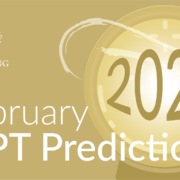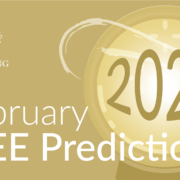Tips for Contracts and Sales on the Multistate Essay Exam
Tips for Contracts and Sales on the Multistate Essay Exam
This time in our MEE tips series we address Contracts and Sales. When thinking about Contracts and Sales on the Multistate Essay Exam, you should consider two questions. How is it tested, and how often is it tested? In the last 10 years (20 administrations), we’ve seen Contracts and Sales on the Multistate Essay Exam in 11 full essays. This makes Contracts and Sales one of the more frequently tested subjects. Therefore, you should budget a significant amount of study time for it! It’s a tricky area, since Contracts and Sales is almost like two subjects in one. You could see an essay from either topic, or even both!
Tips for Contracts and Sales on the Multistate Essay Exam
Standard disclaimer: make sure you are preparing for all of the subjects! Use the frequency statistics to decide how much to study, not whether to study for it at all! Spend the most time on the subjects that are the most likely to come up. But do not ignore any subject!
Here are the most commonly tested topics in Contracts and Sales on the Multistate Essay Exam:
Contract formation
Contract formation is the most basic concept tested in Contracts and Sales on the Multistate Essay Exam. Remember that to have a valid contract, you need an offer, acceptance, and consideration. An offer is a communicated statement of willingness to enter into a bargain with another so that the other understands his assent to the bargain is invited and will conclude it. The terms of an offer need to be reasonably certain. Compare this with a counteroffer under common law, when the terms of the initial offer are changed.
An acceptance is a manifestation of assent to the terms of an offer made in a manner invited by the offer. It is effective upon dispatch. Compare this with a rejection, which is a manifestation of intent not to accept the offer and terminates the offeree’s power to accept an offer. It is effective when received by the offeror. If a rejection is sent and then an acceptance is sent, whichever gets to the recipient first is effective.
Consideration is a bargained-for exchange. A promise to make a gift does not constitute consideration. Neither does promising to perform a legal duty already owed to a promisor, with limited exceptions. A substitute for consideration is promissory estoppel. If there is a promise, reliance that is foreseeable and justifiable, and enforcement is necessary to avoid injustice, the promise will be enforced.
Rejection of Goods vs. Revocation of Acceptance of Goods
These two issues are commonly confused when bar exam takers see Contracts and Sales on the Multistate Essay Exam. A buyer can generally reject goods for any reason under the perfect tender rule, with a few exceptions. However, if a buyer accepts the goods, he can no longer reject them.
In certain circumstances, a buyer can revoke his acceptance of the goods. There are four requirements to be able to do this.
- First, the nonconformity must substantially impair the value to the buyer.
- Second, the buyer accepted the goods because he had a reasonable belief that the nonconformity would be cured (and it was not), or he did not discover the nonconformity because it was difficult to discover or due to the seller’s assurances.
- Third, the buyer revokes within a reasonable time after he discovers or should have discovered the nonconformity.
- Fourth, the buyer revokes before any substantial change in condition of the goods which is not caused by their own defect. If a buyer successfully revokes his acceptance, he can recover the purchase price.
Anticipatory Repudiation vs. Prospective Inability to Perform
Another tricky set of issues in Contracts and Sales on the Multistate Essay Exam is the difference between an anticipatory repudiation and the perspective inability to perform. An anticipatory repudiation occurs when there is an unequivocal manifestation by one party to the other that the party cannot or will not perform its obligations under the contract before the repudiating party’s performance is due. The prospective inability to perform arises when a party has reasonable grounds for insecurity that the other party is unable or unwilling to perform. This is merely doubt and does not rise to the level of an anticipatory repudiation. Under the UCC, the party can then, in writing, demand adequate assurance of performance and may suspend performance until it is received. If assurance does not come within 30 days, the other party may treat it as a repudiation.
Damages
You should always be familiar with damages principles when approaching Contracts and Sales on the Multistate Essay Exam. The normal measure of damages for breach of contract is expectation damages. This aims to give the nonbreaching party the benefit of his bargain. Expectation damages must be foreseeable and proven with reasonable certainty. Punitive damages are not generally recoverable unless the conduct constituting the breach is also a tort for which punitive damages can be recovered. A party must mitigate damages when possible.
Seeking MEE Expertise?
🌟 Freebies & Discounts
- Free Bar Exam Resource Center: Explore for leading guides, articles, and webinars.
- Expert-Crafted Bar Exam Guides: Unveil insights on high-frequency MEE topics and strategies for success.
- Free Webinars: Engage with top bar exam experts.
🔥 Top-Rated MEE Resources
- MEE One-Sheets: Boost your confidence with our most popular bar exam product!
- Bar Exam Outlines: Our comprehensive and condensed bar exam outlines present key information in an organized, easy-to-digest layout.
- NEW MEE Mastery Class: Unearth focused, engaging reviews of essential MEE topics.
- Bar Exam Crash Course and Mini Outlines: Opt for a swift, comprehensive refresher.
- MEE Private Tutoring and feedback: Elevate your approach with tailored success strategies.
- MEE Course: Preview our acclaimed five-star program for unmatched instruction, outlines, and questions.
🔥 NEW! Dive deep into our Repeat Taker Bar Exam Course and discover our unrivaled Platinum Guarantee Pass Program.





